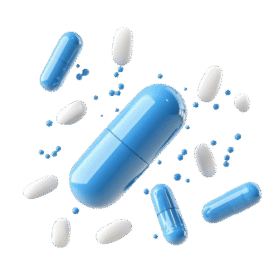
Abecma
What is Abecma?
Abecma (idecabtagene vicleucel) is a CAR T-cell therapy used for treating relapsed or refractory multiple myeloma in certain adults. Abecma is a personalized one-time infusion made from a patient’s own white blood cells, which are genetically modified to recognize and attack multiple myeloma cells.
Abecma FDA approval was granted for treating relapsed or refractory multiple myeloma (rrMM) in adults who have received at least two prior therapies, including an immunomodulatory agent, proteasome inhibitor, and an anti-CD38 monoclonal antibody.
Abecma’s FDA approval was based on positive results from the clinical trial KarMMa-3 Study Abecma patients had a success rate of:
- 72% overall response rate (ORR)
- 28% achieved a stringent complete response
- 25% had a very good partial response
- 19% achieved a partial response
These results highlight Abecma’s effectiveness in delaying disease progression in pre-treated multiple myeloma patients.
How Does Abecma Work?
Abecma is a personalized immunotherapy designed to enhance the body’s immune response against multiple myeloma. It utilizes genetically engineered autologous T cells to target and eliminate cancer cells. The process works as follows:
- Genetic Modification: The T cells are engineered in a laboratory to express a chimeric antigen receptor (CAR), which specifically recognizes B-cell maturation antigen (BCMA), a protein found on multiple myeloma cells.
- CAR Activation & Targeting: Once infused back into the patient, these modified T cells seek out and bind to BCMA-expressing myeloma cells.
- Cancer Cell Destruction: Upon binding, the CAR T cells become activated, triggering an immune response that leads to the destruction of multiple myeloma cells through cytotoxic mechanisms.
This targeted approach enhances the immune system’s ability to attack multiple myeloma cells, potentially leading to prolonged remission for patients who have exhausted other treatment options.
What is the Abecma treatment process?
- Leukapheresis: White blood cells are collected.
- Manufacturing Process: The infusion is created in a specialized lab (takes about 4 weeks).
- Pre-Infusion Chemotherapy: Patients receive three days of chemotherapy before Abecma infusion.
- Infusion: Abecma infusion is administered two days after the completion of lymphodepleting chemotherapy. It is given as an intravenous infusion through a catheter (tube) placed into your vein.Premedication is given 30 to 60 minutes before infusion.
- Monitoring: Patients must remain at the treatment center for at least 7 days post-infusion and within 2 hours of the facility for 4 weeks for safety monitoring.
Your infusion may be delayed for up to 7 days if you have any of the following conditions:
- unresolved serious adverse events (especially pulmonary events, cardiac events, or hypotension), including those after preceding chemotherapies,
- active infections or inflammatory disorders.
Abecma side effects
Common Abecma side effects
Common Abecma side effects may include:
- cytokine release syndrome – CRS (confusion, trouble breathing, fast or irregular heartbeats, feeling light-headed or very tired);
- headache, dizziness;
- problems with speech;
- low blood cell counts;
- fever, chills, tiredness, or other signs of infection;
- decreased appetite, severe nausea or diarrhea;
- pain in your bones, joints, or muscles;
- swelling anywhere in your body; or
- cold symptoms such as stuffy nose, sneezing, sore throat, cough.
Serious Abecma side effects:
Get emergency medical help if you have signs of an allergic reaction: hives; difficulty breathing; swelling of your face, lips, tongue, or throat.
A serious side effect of Abecma is called cytokine release syndrome (CRS). Tell your caregivers right away if you have signs of this condition: fever, chills, trouble breathing, severe vomiting or diarrhea, tremors, shaking, fast or irregular heartbeats, feeling light-headed, or feeling very tired. Your caregivers will have medication available to quickly treat CRS if it occurs.
Also, tell your caregivers or seek emergency medical attention if you have signs of nerve problems, blood disorders, or infection. Symptoms may include problems with speech, problems with thinking or memory, confusion, fatigue, fever, swelling, or a seizure.
Call your doctor at once if you have:
- headaches, dizziness, drowsiness;
- problems with thinking or memory;
- trouble speaking or understanding what is said to you;
- tremors, anxiety, sleep problems;
- seizure;
- right-sided upper stomach pain, vomiting, loss of appetite, yellowing of your skin or eyes, and not feeling well; or
- low blood cell counts – fever, chills, tiredness, flu-like symptoms, mouth sores, skin sores, easy bruising, unusual bleeding, pale skin, cold hands and feet, feeling light-headed or short of breath.
This is not a complete list of side effects and others may occur. Call your doctor for medical advice about side effects. You may report side effects to FDA at 1-800-FDA-1088


